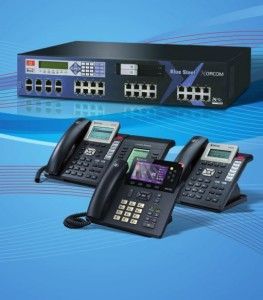
Xorcom IP-PBX with XP series IP phones provides an end-to-end solution for corporate communications.
Understanding Your Needs
The first step is to define the current and future telephony needs of your business. Answering the following questions will provide a good indication of what you should look for in a phone system.
- How many lines and extensions are currently required? In addition to phones, include any device that has to be connected to the system, such as fax machines, modems, and credit card terminals. Branch offices and mobile workers should also be taken into account.
- What are the company’s future needs? If the company plans to expand, take into consideration how many new employees or branches are expected to be added over the next three years. This will help determine the required scalability of the system over time and avoid purchasing a system that will have to be replaced as the company expands.
- What features and options are required for business purposes? Different IP-PBX system manufacturers include different sets of features in the price. Optional features are available at extra cost. Understanding the utility of each feature will enable you to choose the features and options that are most appropriate for your enterprise.
- How much vendor or external support will be required? If you have IT or computer savvy personnel on the team then you may be able to maintain certain IP-PBX systems in-house. On premise IP-PBX systems generally have a friendly interface that enables users to implement customization and maintenance. More complex and proprietary systems will likely require support from vendors. As a result, making changes to the system may introduce hidden costs.
Key Considerations in Choosing a Phone System
Premise-based or hosted
IP-PBX phone systems can either be based on the company’s premises or hosted by the provider and sold as a service. Hosted systems generate fewer upfront costs because there is no initial layout for servers and other hardware. However, any changes that are made over time, such as added features and extensions, usually result in an increase in monthly charges that add up over time. While this arrangement addresses reliability, management, maintenance, and upgrade concerns, it ties the business to a particular vendor and may be more costly in the long run than an on-premise system. Investing in an on-premise system will incur higher start-up costs but can be more cost-effective over time. On-premise systems provide the business with greater flexibility and control over its phone system. It’s important to choose a system that is interoperable with phones and hardware from more than one vendor to avoid having to buy proprietary devices from the phone system vendor.
SIP-based trunking connectivity and compatibility with other technologies
A SIP-based system will support services such as click-to-call on Web pages, instant messaging, and multimedia conferencing that significantly enhance worker productivity and communication efficacy and greatly reduce telecommunications expenses.
Versatility and scalability
Versatility and scalability of the phone system are variables that should be considered before making a decision. Phone systems that support multiple types of endpoints (digital, analog, and IP) will allow the use of existing phones instead of requiring an immediate upgrade of current equipment. Also, determining that the phone system supports office changes and mobile and remote workers will ensure that the system will adapt to the needs of the business as it evolves and grows.
Number of concurrent calls handled
This is a critical factor in determining which system to purchase. A system that fails to support the maximum amount of incoming and outgoing calls will have a detrimental impact on your business. Protect your investment by taking into account the potential for growth of your business in the initial purchasing decision.
Finding a Vendor
Once you have determined your immediate and future needs you will need to find a vendor that can provide the best system for the most cost-effective price. Choosing the right vendor is important because phone systems can be complex and require professional installation as well as training for your employees. Verify with the vendor that training is offered so that your phone system can be set up and operated properly. Find out how updates are managed – remotely or on site – and the type of after sales support provided.
Phone System Features
The list of features intrinsic to the IP-PBX environment is too lengthy to include here. Different vendors include different features and functionality in their systems. Before purchasing a system verify that, at the minimum, standard features include:
- Voicemail
- Call forwarding
- Caller id
- One-touch dialing
- On-hold music
- Fax support and fax to email
- Follow me
- Conferencing
- Speakerphone
- System diagnostics tools
- Paging
Choosing the right IP-PBX system for your business might be intimidating at first but a good vendor will be able to help you define your current and future needs and provide you with the best fitting system for the best price.
Xorcom, established in 2004, designs and manufactures business telephony solutions that support both traditional PSTN and VoIP communication. All Xorcom products are based on the Asterisk open source platform, making them easy to install and maintain as well as cost-effective, since there are no per user license fees.
Xorcom has been awarded “Best of Show” seven times over the past four years by TMCnet, the world’s leading business to business and integrated marketing media company, in categories ranging from “Best On-site Product Launch” through “Best of Open Source” to “Most Innovative Product”.
Xorcom products are available through a worldwide distribution channel and OEM partners.
